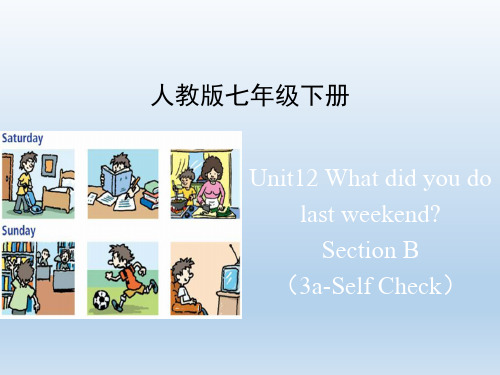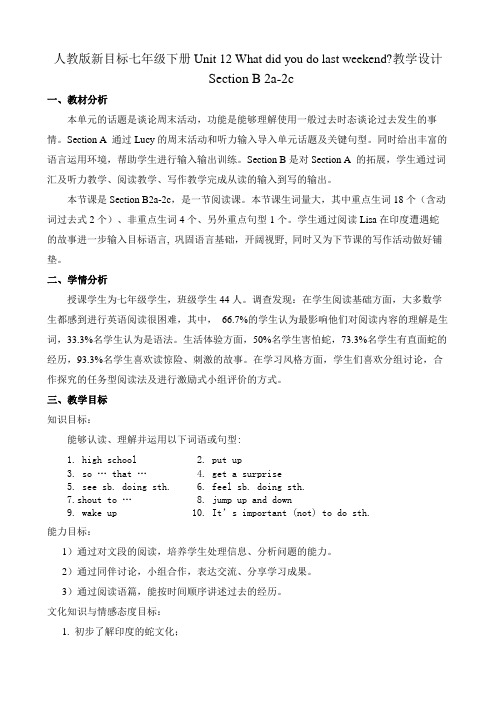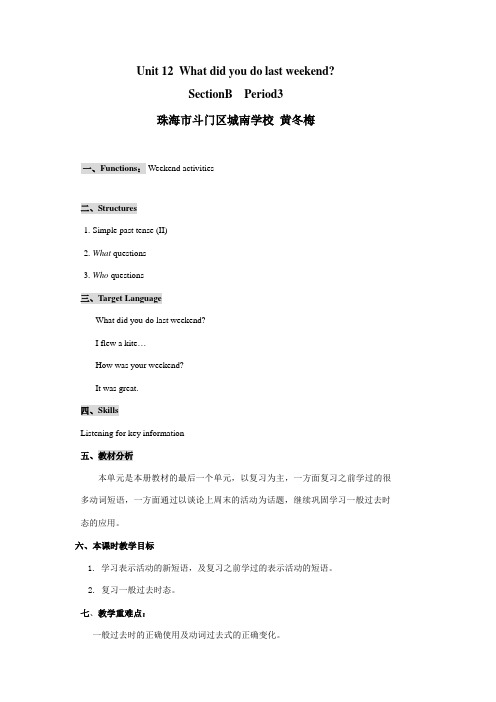人教版初中英语七年级下册Unit12SectionB教材全解
- 格式:doc
- 大小:60.00 KB
- 文档页数:8





人教版新目标七年级下册Unit 12 What did you do last weekend?教学设计Section B 2a-2c一、教材分析本单元的话题是谈论周末活动,功能是能够理解使用一般过去时态谈论过去发生的事情。
Section A 通过Lucy的周末活动和听力输入导入单元话题及关键句型。
同时给出丰富的语言运用环境,帮助学生进行输入输出训练。
Section B是对Section A 的拓展,学生通过词汇及听力教学、阅读教学、写作教学完成从读的输入到写的输出。
本节课是Section B2a-2c,是一节阅读课。
本节课生词量大,其中重点生词18个(含动词过去式2个)、非重点生词4个、另外重点句型1个。
学生通过阅读Lisa在印度遭遇蛇的故事进一步输入目标语言, 巩固语言基础,开阔视野, 同时又为下节课的写作活动做好铺垫。
二、学情分析授课学生为七年级学生,班级学生44人。
调查发现:在学生阅读基础方面,大多数学生都感到进行英语阅读很困难,其中,66.7%的学生认为最影响他们对阅读内容的理解是生词,33.3%名学生认为是语法。
生活体验方面,50%名学生害怕蛇,73.3%名学生有直面蛇的经历,93.3%名学生喜欢读惊险、刺激的故事。
在学习风格方面,学生们喜欢分组讨论,合作探究的任务型阅读法及进行激励式小组评价的方式。
三、教学目标知识目标:能够认读、理解并运用以下词语或句型:1. high school2. put up3. so … that …4. get a surprise5. see sb. doing sth.6. feel sb. doing sth.7.shout to … 8. jump up and down9. wake up 10. It’s important (not) to do sth.能力目标:1)通过对文段的阅读,培养学生处理信息、分析问题的能力。
2)通过同伴讨论,小组合作,表达交流、分享学习成果。

Unit 12 What did you do last weekend?SectionB Period3珠海市斗门区城南学校黄冬梅一、Functions: Weekend activities二、Structures1. Simple past tense (II)2. What questions3. Who questions三、Target LanguageWhat did you do last weekend?I flew a kite…How was your weekend?It was great.四、SkillsListening for key information五、教材分析本单元是本册教材的最后一个单元,以复习为主,一方面复习之前学过的很多动词短语,一方面通过以谈论上周末的活动为话题,继续巩固学习一般过去时态的应用。
六、本课时教学目标1. 学习表示活动的新短语,及复习之前学过的表示活动的短语。
2. 复习一般过去时态。
七、教学重难点:一般过去时的正确使用及动词过去式的正确变化。
The Third Period (Section B, 1a–1e)Teaching aims (教学目标)1. 继续学习表示活动的短语,及动词过去式。
2. 继续学习使用一般过去式态谈论过去发生的事情。
3. 能够理解听力材料。
Language points (语言点)1. 词汇:1)名词n. kite2)动词v. fly2. 句型:Who went to the library?Sally did.Did you do anything interesting last weekend?Not really, but I visited my sister.Difficulties1. 区分有趣和无聊的活动。
2. 对事件的评价。
Teaching steps1. Warm-up and revision(1) Daily greeting to Ss.(2) Listen to a song If you’re happy.T: Tomorrow is Saturday,are you happy? Let’s listen to a song If you’re happy.2. Guessing gameT: I have many friends,guess what they did last weekend,then you can get one point for your group.3. Look and answer(1)T: Sally and Jim had a busy weekend. Look at the pictures. Can you tell me what theydid?T: What did Sally do yesterday?S: She flew a kite yesterday. She flies a kite every week.T: What did Jim do yesterday?S: He swam yesterday. He swims every week.(Help Ss to use the other phrases in 1a to answer the questions. such as sang and played the guitar, studied for a test, had dinner with friends, went to the library.)(2)Flash the pictures on the screen as quickly as possible. Then ask Ss “What did he/she do?” Have Ss answer the question as quickly as they can.(3) Show the phrases again and help Ss change the verbs from the present tense to the simple past form.sing and play the guitar - sing and played the guitarstudy for a test - studied for a testhave dinner with friends - had dinner with friendsgo to the library - went to the libraryfly a kite - flew a kiteswim in a swimming pool – swam in a swimming pool3.Work on 1a & 1bHere are some things that Sally and Jim did yesterday. Match the activities with the pictures.【教学设计说明】通过对每幅图片的描述,引导学生由使用旧知识过渡到自主使用新知识,达到了自然呈现的目的。
Section B第4课时(2a~2c)知人者智,自知者明。
《老子》原创不容易,【关注】店铺,不迷路!类别学习重点重点单词oon,surprise,jump,wake,snake,move,forest,into,ear,start重点短语getasurprise,putup,eachother,highschool,shoutto,upanddown,so…that,wake…up重点句式1.Tadeafiretokeepuswarm.2.Whenwelookedoutofourtent,wesawabigsnakesleepingnearthefire.课前预习写一写1.印度India2.以前ago3.月亮moon4.蛇snake5.移动move6.森林forest7.开始start8.耳朵ear9.到……里面;进入into译一译1.吃惊getasurprise2.搭起;举起putup3.对……大声喊叫spupanddown5.把……弄醒wake…up背一背1.两周前我姐姐中学毕业。
Mysisterfinisadeafiretokeepuswarm.3.当我们向帐篷外看时看见一条大蛇在火旁睡觉。
Whenwelookedoutofourtent,wesawabigsnakesleepingnearthefire.新课导入Teacaketeetasnake?Ifyouwanttoknowtetogether.新课展示新课展示【完成教材2b~2c的教学任务】1.让学生快速阅读2b短文,了解短文大意。
2.让学生认真阅读短文,根据短文内容完成练习。
师生集体核对答案。
3.让学生再仔细阅读一遍短文,把2c的句子按正确顺序排列,小组内核对答案。
4.教师要求学生大声朗读2c中排列好的句子,然后让几个学生复述课文内容。
【语法提要】so…tself.他是如此年轻,以至于他不能照顾自己。
2.seesb.doingstgointotheshop.我看见他进了商店。
Unit 12 What did you do last weekend?Section A 2a — 2d (P68)* 教师寄语:If you want to understand today, you have to search yesterday.想要懂得今天,就必须研究昨天。
【学习目标】【学习重点】:继续学习谈论过去事件; 学会用疑问词who, what, when。
【体验学习】:预习交流1.根据图片和对话等,预测新课内容;2.根据音标拼读单词并牢记;3.自学课文,勾画出重点和疑惑。
翻译官visit my grandma_______________ 2.备考_____________________3. work as a guide _________________4. over______________________5. How interesting! ________________6. living habit_________________7. kind of _______________________ 8. 熬夜_____________________【课堂导学】:I、新课呈现Step1 Review and Lead-inQuick action: The phrases in 1a or the past forms of the verbs.Step2 PresentationShow some pictures, ask and learn. eg:--What did you/he/ she/they do? --Where did you/he/she/they go?--Who…?Step3 Listening1. Go through the sentences in 2a.2. Listen to 2a and underline the words you hear.3. Listen again. Write C for Carol, J for Jack or B for Becky next to the statements in 2b. Then check the answers.Step4 Pair workStudent A asks questions with who, what or where and Student B answers. Finish 2c. Role-play the conversations in 2d.II、合作交流Group work:模仿2d编写对话,谈论过去事件。
教学设计第四课时 Section B(2a~2c)§自主学习方案学生自学新单词(教材P71-72的单词),看谁记得又根据句意及首字母或汉语提示完成句子。
1.She lived here two years ago.2.They put up their tents in the open air and slept in it last night.3.When we saw a big snake sleeping near the river,we got a terrible surprise.4.We can hear everything in the nature with our ears.5.The alarm clock wakes me up every morning.6.He was so scared(惊慌的)that he couldn’t move.7.The snake moved into the forest(森林)near the lake. §课堂导学方案 Step 1 情景导入 Teacher:Nice to meet you! What day is it today?Did you have a busy weekend?What did you do on Saturday morning/ afternoon/ evening?What did you do on Sunday morning/ afternoon/ evening?What did he/she do on Saturday morning/ afternoon/ evening?What did he/she do on Sunday morning/ afternoon/ evening?What animals are you afraid of? Let us discuss 环节说明:通过谈论同学们周末的各项活动,让学生掌握并灵活运用本单元所学的语言知识,激发学生的学习兴趣,调动学生的学习积极性与主动性,并导入本大学情分析七年级的学生在这阶段已经不太爱表现自己了,也已经出现了两级分化现象。
人教版初中英语七年级下册Unit12SectionB教材全解Unit 12 What did you do last weekend?Unit 12 Section B教材全解1.flew a kite放风筝【重点注释】flew为fly的过去式,fly此处作及物动词,意为“放飞(风筝、飞机模型等)”,fly a kite=fly kites放风筝。
例如:Can you fly a kite?你能放风筝吗?We flew kites in the park last Sunday.上个星期天我们在公园里放风筝了。
My father helped me to fly the model plane.我的父亲帮助我放飞飞机模型。
【拓展记忆】fly还可作不及物动词:1)意为“飞,飞行”,fly to sw.=go to sw.by plane/air=take a plane to sw.乘飞机去某地。
例如:I wanted to fly like a bird.我想象鸟一样飞。
We flew to Beijing yesterday.昨天我们乘飞机去的北京。
He flew back to London.他飞回了伦敦。
Mr. Li flew to Shanghai.=Mr.Li went to Shanghai by plane/air.=Mr.Li took a plane to Shanghai.李先生乘飞机去上海了。
2)意为“飞逝”。
例如:How times flies!时间过得真快呀!2.swam in a swimming pool 在游泳池里游泳【重点注释】swam为动词swim的过去式;swimming是动词swim的动名词形式,在此用作定语,表示用途或功能,即a swimming pool=a pool for swimming。
类似的表达还有:a sitting room起居室,a reading room阅览室,a waiting room 候车室。
3.Did you do anything interesting last weekend?上个周末你做什么有趣的事情了吗?【重点注释】★anything意为“任何事情”,它是不定代词,常用于否定句或疑问句中。
例如:He didn’t do anything this morning.今天早上他没做任何事情。
★anything interesting意为“有趣的事;任何有趣的事情”,形容词interesting修饰不定代词anything应后置,在句中作后置定语(即形容词应位于不定代词之后)。
【语法】当形容词修饰something/anything/nothing等不定代词时,形容词要位于不定代词之后。
例如:He told us something interesting.他告诉了我们一些有趣的事。
This isn’t anything important.这并不是什么重要的东西。
Is there anything interesting in today’s newspaper?今天的报纸上有什么有趣的事情吗?【拓展记忆】1)不定代词something一般用于肯定句中;anything一般用于否定句、疑问句和条件状语从句中;nothing表示否定含义,构成否定句。
例如:I have something to tell you.→I don’t have anything to tell you./I have nothing to tell you.→Do you have anything to tell me?(Do you have nothing to tell me?) If you want anything,call me.如果你想要任何东西,给我打电话。
2)something可用于提建议或请求的问句中,以及希望说话对方作出肯定回答的问句中。
例如:Would you like something to eat?你想要吃的东西吗?3)不定代词在句中作主语时,谓语动词一般用单数形式。
例如:Nothing can make me cry.什么也不能使我哭。
的区别,然后补全“思考”和“结论”中所缺内容。
A. The boy has something to tell you. 这个男孩有事要告诉你。
B. Is there anything interesting in today’s newspaper?今天报纸上有什么有趣的东西吗?C. The teacher didn’t say anything in class.这位老师上课时什么也没说。
D. The teacher said nothing in class. 这位老师上课时什么也没说。
【思考】A句是肯定句,用的是 ___________ ;B句是一般疑问句,C句是否定句,两句用的是_______________;D句和C句是同义句,D句用的是nothing,此句表示否定意义。
(something; anything )【结论】1. something多用在____________ 句中;anything多用在 ___________句或疑问句中。
nothing意为“什么也没有”,是表示否定的不定代词,相当于_________。
2. ___________也可以用在表示请求、建议或期望得到肯定回答的句子中。
例如: Would you like something to eat? 你想要点吃的吗?3. 从B句中的anything interesting可以看出,当有形容词修饰这些不定代词时,形容词要位于不定代词___________ (填“之前”或“之后”)。
(1. 肯定;否定;not ... anything 2. something 3. 之后)【运用】选用something, anything或nothing填空。
1. Lingling, come here, please. I have ____________ to tell you.2. We looked around, and didn’t find ____________ .3. ______________ is difficult if you put all your heart into it.(1. something 2. anything 3. Nothing )4.My sister finished high school two years ago.我姐姐(妹妹)两周前中学毕业了。
【重点注释】①小学:primary school,elementary school,grade school;中学:middle school(统称),junior high school(初中),senior high school(高中)。
②★high形容词,意为“高级的;重要的”。
例如:I knew him in high school.我在中学时代就认识他了。
He is a high official.他是个高级官员。
★high还可意为“高的”,强调物体高出地面的空间高度。
例如:The table is two metres high.这张桌子两米高。
The garden’s got very high walls.花园有很高的墙。
The mountain is very high.这座山很高。
★high还可作副词,主要修饰动词,意为“高地”。
例如:He jumps high.他跳得高。
【试题链接】Mount Qomolangma,“the roof of the world”,is about 8844.43 metres .A.tallB.highC.highlyD.height(tall指人或物的高,不能指山脉的高;high可指物体的高,尤其指山脉的高;highly副词,意为“高度地”;height名词,意为“高度”。
答案:B)③ago副词,以前,常用于“一段时间+ago”结构中,意为“……以前”,表示“现在以前的某个时间”,常用于一般过去时态,two days ago两天前,a month/year/week ago一个月/一年/一个周以前。
例句:I visited my grandma three days ago.我三天前看望了我的奶奶。
He left here five years ago.他五年前就离开这儿了。
Two days ago I went to visit him.两天前我去拜访了他。
【助记】ago的用法:立足现在往前算,ago出来挑重担。
途公共汽车来到乡下的一个湖(边)。
【重点注释】ride此处是可数名词,意为“(乘车的)旅行,旅程”。
例如:He gave me a ride to the plaza.他让我搭车去市场。
It’s only a 5-metre ride to the park by bus.乘坐公共汽车去公园仅需5分钟。
It’s a twenty-minute train ride from here.从这里乘火车需要20分钟。
【拓展记忆】1)ride作名词时,常用短语:★go for a +交通工具+ride =go for a ride on/in+a/an/the+交通工具“开/骑/坐(乘)……兜风”。
例如:We went for a car ride.=We went for a ride in the car.我们去开(坐)车兜风了。
we went for a ride on the horseback. 我们骑马。
Shall we go for a ride in the car?我们开车兜一会儿风好吗? Let's go for a ride on horseback.我们出去骑马兜兜风吧。
★have/take a ride“兜风”,have/take a ride on/in+a/an/the+交通工具= have/take a +交通工具+ride “骑/坐(乘)……兜风”。
例如:I had a ride on a horse for an hour.我骑了一个小时的马。
He often takes a ride when he is free.当他有空时,他经常去兜风。
He took a ride on a bus in the city.=He took a bus ride in the city.他乘公共汽车在市里兜了一圈。
2)ride还可作动词,意为“骑(马等);乘(车)”等。